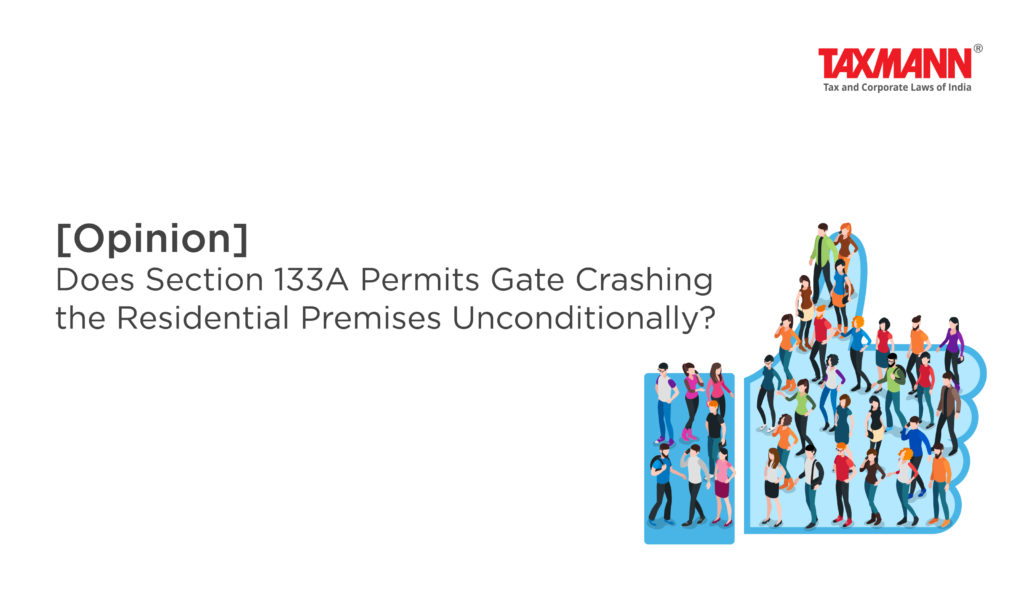[Opinion] Does Section 133A Permits Gate Crashing the Residential Premises Unconditionally?
- Blog|News|Income Tax|
- 3 Min Read
- By Taxmann
- |
- Last Updated on 17 May, 2023

CMA Raji Nathani & CA Gopal Nathani – [2023] 150 taxmann.com 287 (Article)
Section 133A found place in the IT act in 1964 to empower the tax authorities to undertake survey of the business premises. Subsequently in 1967 a circular No. 7-D(LXII-7) of 1967, dated 3-5-1967 is issued by the board stating that residential place is out of bound of survey. The circular read the following: –
“The place which an Income-tax Officer or an Inspector, authorized by him in this behalf, may enter under the provisions of section 133A, must be either a place within the limits of the area under the jurisdiction of the Income-tax Officer or any place occupied by any person in respect of whom the Income-tax Officer exercises jurisdiction, at which a business or profession is carried on. The provisions of section 133A make it clear that, in either case, the place must be one where the business or profession of an assessee is carried on, although it is not necessary that it should be the principal place of business or profession. The place, where entry can be made under the section, must not be a place where the assessee does not carry on business.Business or residential premises of third parties, including a chartered accountant, a pleader or income-tax practitioner, of whom the assessee may be client, are not places which could be entered into for the purpose of section 133A. It would be improper for an Income-tax Officer or an Inspector, authorized by him in this behalf, to enter the office of a chartered accountant for the purpose of inspecting the books of his client. It is also necessary that the place entered should be the business premises and not residential premises of the assessee and the entry should be during business or office hours.
It may, however, be noted that the above restrictions do not apply to cases of search and seizure specifically authorized under section 132 by the Commissioner of Income-tax/Director of Inspection, which will be governed by the provisions of that section.”
Thus there has been a common understanding that power to conduct income tax survey is limited to the business premises.
The section got reworded in 1975 by which an explanation was also inserted in section 133A as under:
Power of survey
133A. (1) Notwithstanding anything contained in any other provision of this Act, an income-tax authority may enter—
(a) any place within the limits of the area assigned to him, or
(b) any place occupied by any person in respect of whom he exercises jurisdiction, or
(c) any place in respect of which he is authorised for the purposes of this section by such income-tax authority, who is assigned the area within which such place is situated or who exercises jurisdiction in respect of any person occupying such place,
at which a business or profession or an activity for charitable purpose is carried on, whether such place be the principal place or not of such business or profession or of such activity for charitable purpose, and require any proprietor, trustee, employee or any other person who may at that time and place be attending in any manner to, or helping in, the carrying on of such business or profession or such activity for charitable purpose—
(i) to afford him the necessary facility to inspect such books of account or other documents as he may require and which may be available at such place,
(ii) to afford him the necessary facility to check or verify the cash, stock or other valuable article or thing which may be found therein, and
(iii) to furnish such information as he may require as to any matter which may be useful for, or relevant to, any proceeding under this Act.
Click Here To Read The Full Article
Disclaimer: The content/information published on the website is only for general information of the user and shall not be construed as legal advice. While the Taxmann has exercised reasonable efforts to ensure the veracity of information/content published, Taxmann shall be under no liability in any manner whatsoever for incorrect information, if any.

Taxmann Publications has a dedicated in-house Research & Editorial Team. This team consists of a team of Chartered Accountants, Company Secretaries, and Lawyers. This team works under the guidance and supervision of editor-in-chief Mr Rakesh Bhargava.
The Research and Editorial Team is responsible for developing reliable and accurate content for the readers. The team follows the six-sigma approach to achieve the benchmark of zero error in its publications and research platforms. The team ensures that the following publication guidelines are thoroughly followed while developing the content:
- The statutory material is obtained only from the authorized and reliable sources
- All the latest developments in the judicial and legislative fields are covered
- Prepare the analytical write-ups on current, controversial, and important issues to help the readers to understand the concept and its implications
- Every content published by Taxmann is complete, accurate and lucid
- All evidence-based statements are supported with proper reference to Section, Circular No., Notification No. or citations
- The golden rules of grammar, style and consistency are thoroughly followed
- Font and size that’s easy to read and remain consistent across all imprint and digital publications are applied



 CA | CS | CMA
CA | CS | CMA
